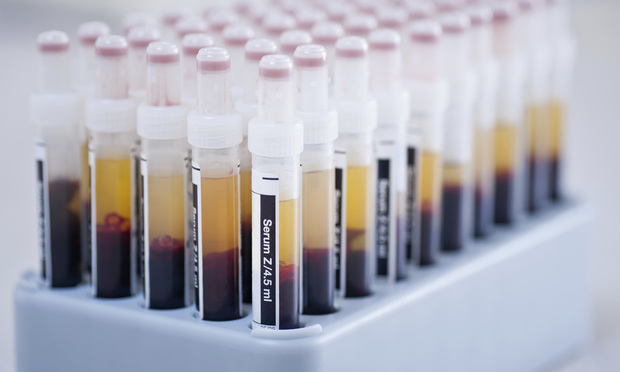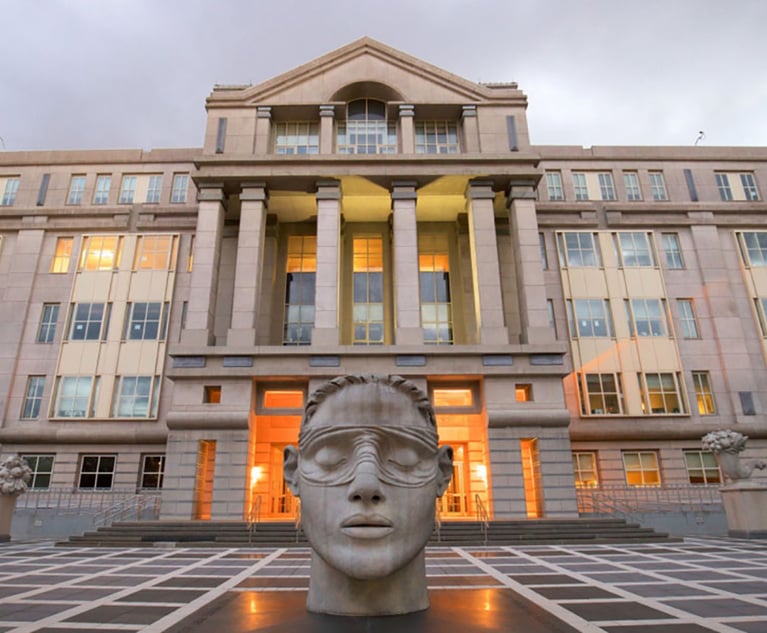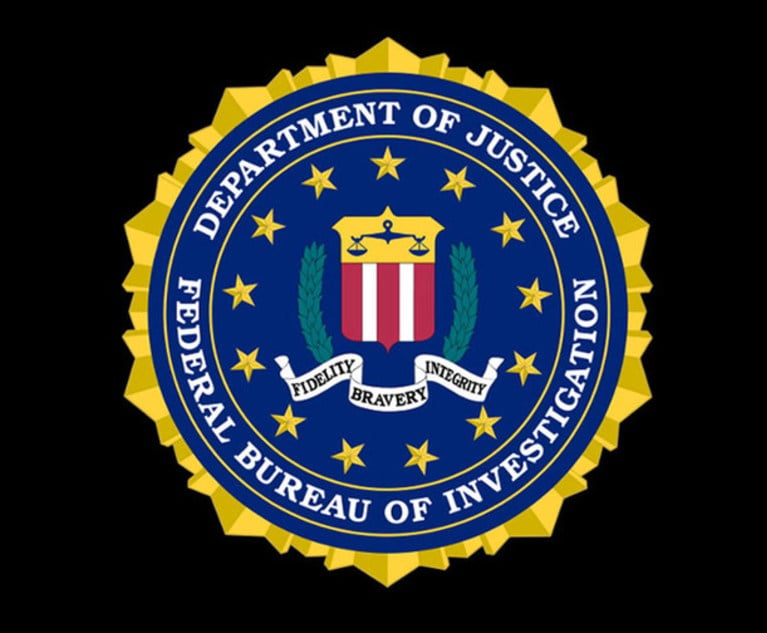Conviction Upheld for Doctor Who Took Cash From Lab for Blood Draws
The doctor argued that the sentence should be vacated because the trial court failed to take into account his "positive qualities," or recognize a sentencing disparity between his case and other doctors in the same scheme.
September 24, 2019 at 12:57 PM
4 minute read
 Blood test samples/photo by Ingus Bajars
Blood test samples/photo by Ingus Bajars
A federal appeals court has rejected a doctor's bid to overturn his conviction for taking payouts from a laboratory to set up a blood draw station in his office.
The U.S. Court of Appeals for the Third Circuit on Tuesday denied Dr. Thomas Savino's appeal of his conviction and sentence of four years in prison.
According to Third Circuit Judge Thomas Hardiman's opinion, Savino, whose practice was based in Staten Island, New York, accepted monthly cash payments from Biodiagnostic Laboratory Services, a blood laboratory that was headquartered in Parsippany but is now reportedly defunct.
Savino entered into a deal with Cliff Antell, a Biodiagnostic recruiter, to allow the company to set up a blood draw area in the rear suite of his solo medical practice, Hardiman said.
In 2013, Antell began cooperating with the FBI following an investigation of Biodiagnostic, and wore a wire while discussing a deal with Savino to replace the current arrangement, the decision said.
Savino was subsequently indicted on 10 counts, including conspiracy to violate the Anti-Kickback Statute, and convicted on all of them. The court below rejected his motion for a more lenient sentence based on family ties and responsibilities.
On appeal to the Third Circuit, Savino argued that the government failed to show sufficient evidence that he took bribes. He claimed he thought the cash payments from Biodiagnostic were rent.
"Savino allowed BLS to operate a laboratory in his office space without a written agreement in return for cash payments. The lab had no public entrance—patients could access the area where blood was drawn only through Savino's office," Hardiman said. "In the conversation Antell recorded, Savino haggled over the payment scheme with a new potential lab, explaining he had 'good volume' and could send them certain urine testing 'that pays tremendously well.' He accepted a cash payment of $1,500 ostensibly from the new lab and offered to split monthly cash payments with Antell if he got the company to do urine testing.
"These facts more than suffice to sustain a jury verdict, which must be upheld as long as it does not 'fall below the threshold of bare rationality,'" Hardiman wrote.
Savino also argued that New Jersey commercial bribery statute and Travel Act charges should be dismissed as void for vagueness. He claimed that the prosecution failed to show that a fiduciary relationship existed between him and Biodiagnostic. However, the court found Savino's argument unpersuasive.
Lastly, Savino argued that the sentence should be vacated because the trial court failed to take into account his "positive qualities," or recognize a sentencing disparity between his case and other doctors in the same Biodiagnostic scheme.
"At sentencing, the Court distinguished Savino from those defendants (who had lower guidelines ranges and received downward departures for cooperation) and explicitly compared Savino to [one defendant doctor] (who received leniency because of his age)," Hardiman said. "So the Court gave meaningful consideration to sentencing disparities."
He added, "Savino contends his 48-month sentence is substantively unreasonable because the court failed to account for his positive traits, including his service to his community as a physician. But the record again contradicts this claim. The court considered Savino's arguments for mitigation, including the letters and videos from patients supporting him and his filial obligation to his elderly mother."
The sentence was reasonable, Hardiman said.
The U.S. Attorney's Office for the District of New Jersey declined to comment.
Eric Breslin of Duane Morris in Newark represents Savino and also declined to comment.
This content has been archived. It is available through our partners, LexisNexis® and Bloomberg Law.
To view this content, please continue to their sites.
Not a Lexis Subscriber?
Subscribe Now
Not a Bloomberg Law Subscriber?
Subscribe Now
NOT FOR REPRINT
© 2025 ALM Global, LLC, All Rights Reserved. Request academic re-use from www.copyright.com. All other uses, submit a request to [email protected]. For more information visit Asset & Logo Licensing.
You Might Like
View All
'Younger and Invigorated Bench': Biden's Legacy in New Jersey Federal Court
5 minute read
3rd Circuit Strikes Down NLRB’s Monetary Remedies for Fired Starbucks Workers


As Trafficking, Hate Crimes Rise in NJ, State's Federal Delegation Must Weigh in On New UN Proposal
4 minute readTrending Stories
- 1Why Wait? Arbitrate! The Value of Consenting to Arbitrate Your Sum Cases at NAM
- 2The Legal Status of Presidential Diaries Must Be Clarified
- 3Litigators of the Week: Shortly After Name Partner Kathleen Sullivan’s Retirement, Quinn Emanuel Scores Appellate Win for Vimeo
- 4Litigator of the Week Runners-Up and Shout-Outs
- 5Weil Hires White & Case Partner in Rebuild of London Finance Ranks
Who Got The Work
J. Brugh Lower of Gibbons has entered an appearance for industrial equipment supplier Devco Corporation in a pending trademark infringement lawsuit. The suit, accusing the defendant of selling knock-off Graco products, was filed Dec. 18 in New Jersey District Court by Rivkin Radler on behalf of Graco Inc. and Graco Minnesota. The case, assigned to U.S. District Judge Zahid N. Quraishi, is 3:24-cv-11294, Graco Inc. et al v. Devco Corporation.
Who Got The Work
Rebecca Maller-Stein and Kent A. Yalowitz of Arnold & Porter Kaye Scholer have entered their appearances for Hanaco Venture Capital and its executives, Lior Prosor and David Frankel, in a pending securities lawsuit. The action, filed on Dec. 24 in New York Southern District Court by Zell, Aron & Co. on behalf of Goldeneye Advisors, accuses the defendants of negligently and fraudulently managing the plaintiff's $1 million investment. The case, assigned to U.S. District Judge Vernon S. Broderick, is 1:24-cv-09918, Goldeneye Advisors, LLC v. Hanaco Venture Capital, Ltd. et al.
Who Got The Work
Attorneys from A&O Shearman has stepped in as defense counsel for Toronto-Dominion Bank and other defendants in a pending securities class action. The suit, filed Dec. 11 in New York Southern District Court by Bleichmar Fonti & Auld, accuses the defendants of concealing the bank's 'pervasive' deficiencies in regards to its compliance with the Bank Secrecy Act and the quality of its anti-money laundering controls. The case, assigned to U.S. District Judge Arun Subramanian, is 1:24-cv-09445, Gonzalez v. The Toronto-Dominion Bank et al.
Who Got The Work
Crown Castle International, a Pennsylvania company providing shared communications infrastructure, has turned to Luke D. Wolf of Gordon Rees Scully Mansukhani to fend off a pending breach-of-contract lawsuit. The court action, filed Nov. 25 in Michigan Eastern District Court by Hooper Hathaway PC on behalf of The Town Residences LLC, accuses Crown Castle of failing to transfer approximately $30,000 in utility payments from T-Mobile in breach of a roof-top lease and assignment agreement. The case, assigned to U.S. District Judge Susan K. Declercq, is 2:24-cv-13131, The Town Residences LLC v. T-Mobile US, Inc. et al.
Who Got The Work
Wilfred P. Coronato and Daniel M. Schwartz of McCarter & English have stepped in as defense counsel to Electrolux Home Products Inc. in a pending product liability lawsuit. The court action, filed Nov. 26 in New York Eastern District Court by Poulos Lopiccolo PC and Nagel Rice LLP on behalf of David Stern, alleges that the defendant's refrigerators’ drawers and shelving repeatedly break and fall apart within months after purchase. The case, assigned to U.S. District Judge Joan M. Azrack, is 2:24-cv-08204, Stern v. Electrolux Home Products, Inc.
Featured Firms
Law Offices of Gary Martin Hays & Associates, P.C.
(470) 294-1674
Law Offices of Mark E. Salomone
(857) 444-6468
Smith & Hassler
(713) 739-1250






